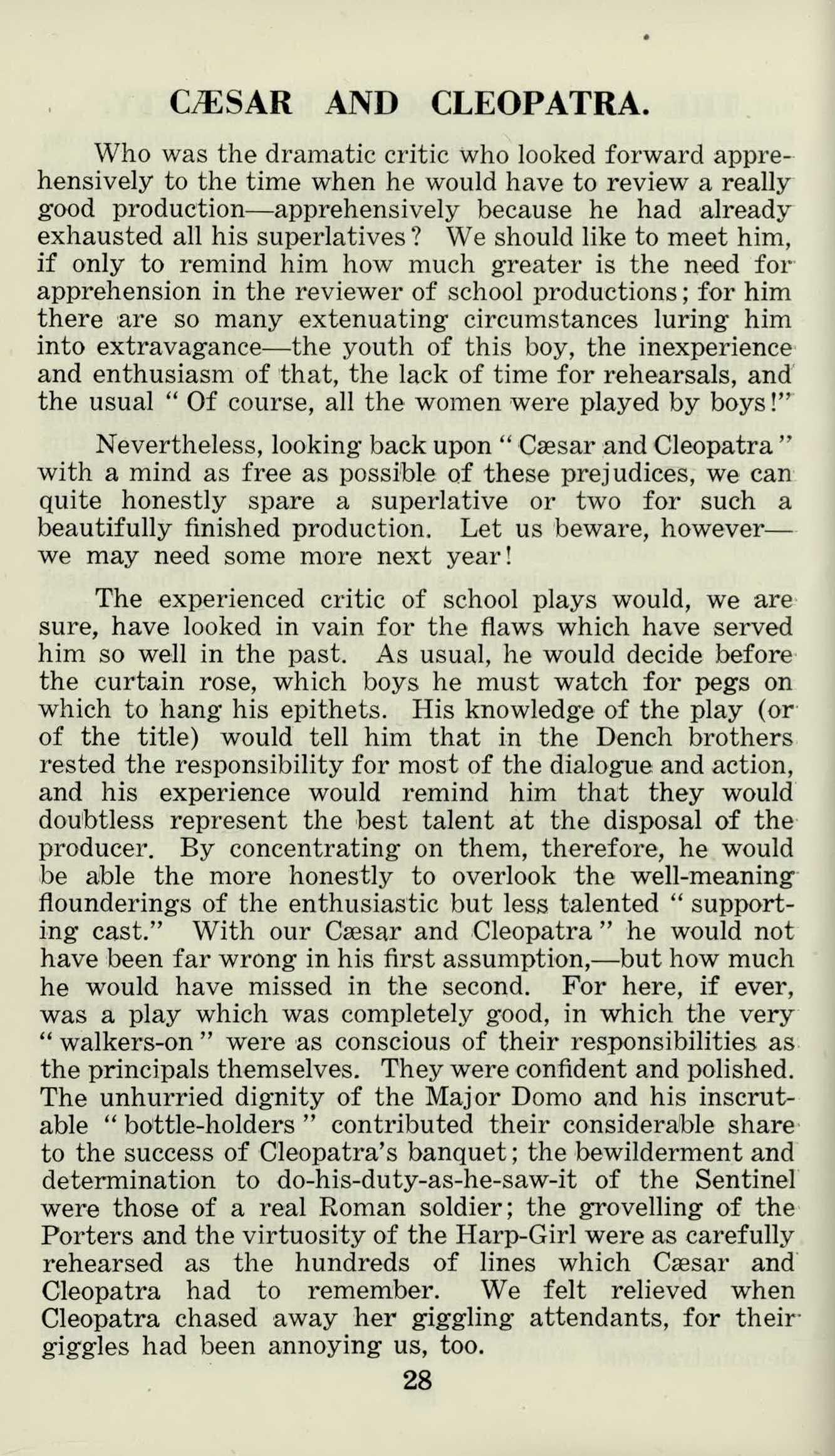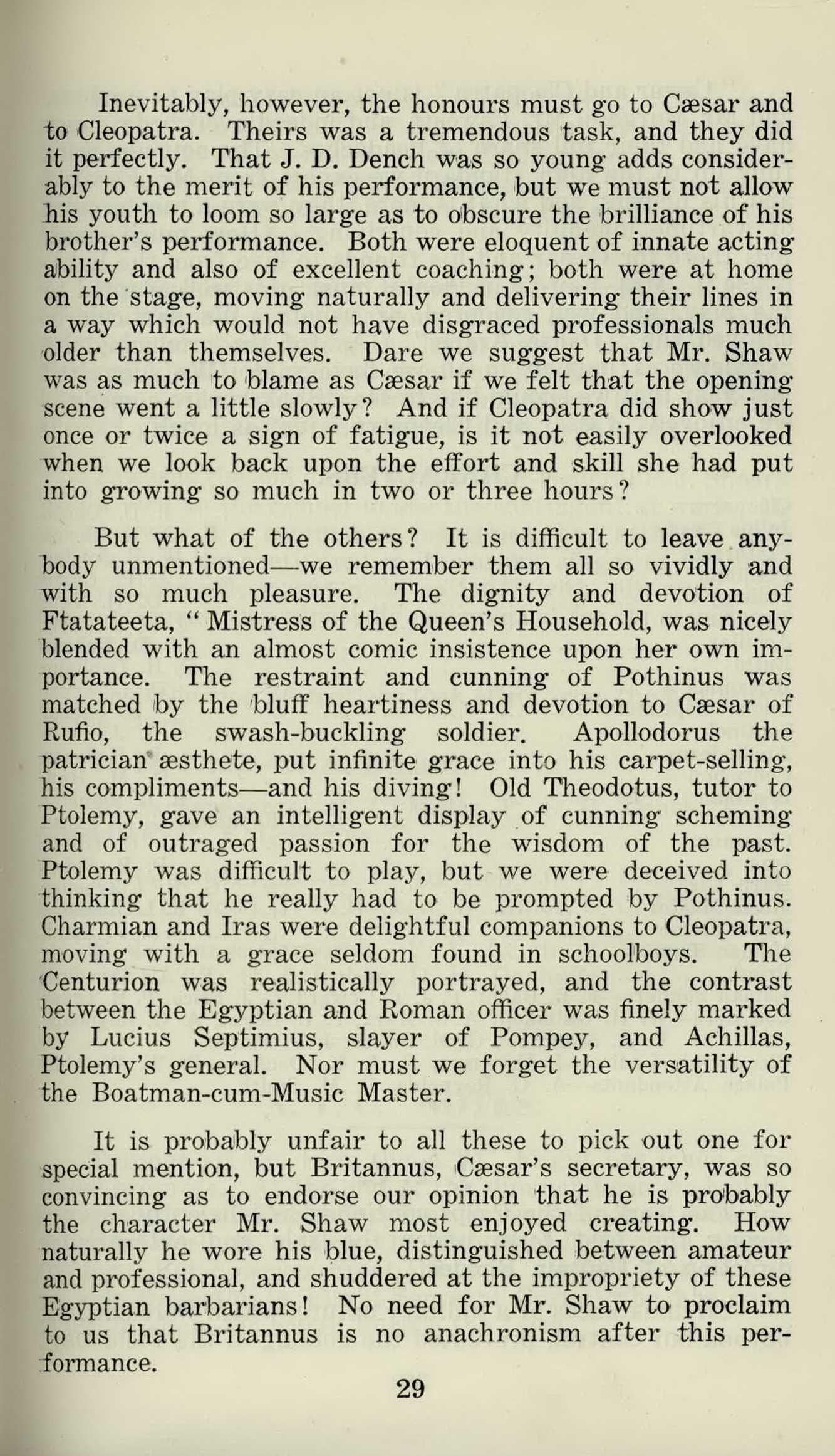
4 minute read
THE SCHOOL PLAY
from Jan 1943
by StPetersYork
Who was the dramatic critic who looked forward apprehensively to the time when he would have to review a really good production—apprehensively because he had already exhausted all his superlatives ? We should like to meet him, if only to remind him how much greater is the need for apprehension in the reviewer of school productions ; for him there are so many extenuating circumstances luring him into extravagance—the youth of this boy, the inexperience and enthusiasm of that, the lack of time for rehearsals, and the usual " Of course, all the women were played by boys !"
Nevertheless, looking back upon "Caesar and Cleopatra " with a mind as free as possible of these prejudices, we can quite honestly spare a superlative or two for such a beautifully finished production. Let us beware, however— we may need some more next year !
The experienced critic of school plays would, we are sure, have looked in vain for the flaws which have served him so well in the past. As usual, he would decide before the curtain rose, which boys he must watch for pegs on which to hang his epithets. His knowledge of the play (or of the title) would tell him that in the Dench brothers rested the responsibility for most of the dialogue and action, and his experience would remind him that they would doubtless represent the best talent at the disposal of the producer. By concentrating on them, therefore, he would be able the more honestly to overlook the well-meaning flounderings of the enthusiastic but less talented " supporting cast." With our Csar and Cleopatra " he would not have been far wrong in his first assumption,—but how much he would have missed in the second. For here, if ever, was a play which was completely good, in which the very " walkers-on " were as conscious of their responsibilities as the principals themselves. They were confident and polished. The unhurried dignity of the Major Domo and his inscrutable " bottle-holders " contributed their considerable share , to the success of Cleopatra's banquet ; the bewilderment and determination to do-his-duty-as-he-saw-it of the Sentinel were those of a real Roman soldier; the grovelling of the Porters and the virtuosity of the Harp-Girl were as carefully rehearsed as the hundreds of lines which Csar and Cleopatra had to remember. We felt relieved when Cleopatra chased away her giggling attendants, for their giggles had been annoying us, too.
28
Inevitably, however, the honours must go to Caesar and to Cleopatra. Theirs was a tremendous task, and they did it perfectly. That J. D. Dench was so young adds considerably to the merit of his performance, but we must not allow his youth to loom so large as to obscure the brilliance of his brother's performance. Both were eloquent of innate acting ability and also of excellent coaching; both were at home on the 'stage, moving naturally and delivering their lines in a way which would not have disgraced professionals much older than themselves. Dare we suggest that Mr. Shaw was as much to blame as Caesar if we felt that the opening scene went a little slowly ? And if Cleopatra did show just once or twice a sign of fatigue, is it not easily overlooked when we look back upon the effort and skill she had put into growing so much in two or three hours ?
But what of the others ? It is difficult to leave anybody unmentioned—we remember them all so vividly and with so much pleasure. The dignity and devotion of Ftatateeta, " Mistress of the Queen's Household, was nicely blended with an almost comic insistence upon her own importance. The restraint and cunning of Pothinus was matched by the bluff heartiness and devotion to Caesar of Rufio, the swash-buckling soldier. Apollodorus the patrician' aesthete, put infinite grace into his carpet-selling, his compliments—and his diving! Old Theodotus, tutor to Ptolemy, gave an intelligent display of cunning scheming and of outraged passion for the wisdom of the past. Ptolemy was difficult to play, but we were deceived into thinking that he really had to be prompted by Pothinus. Charmian and Iras were delightful companions to Cleopatra, moving with a grace seldom found in schoolboys. The Centurion was realistically portrayed, and the contrast between the Egyptian and Roman officer was finely marked by Lucius Septimius, slayer of Pompey, and Achillas, Ptolemy's general. Nor must we forget the versatility of the Boatman-cum-Music Master.
It is probably unfair to all these to pick out one for special mention, but Britannus, Caesar's secretary, was so convincing as to endorse our opinion that he is probably the character Mr. Shaw most enjoyed creating. How naturally he wore his blue, distinguished between amateur and professional, and shuddered at the impropriety of these Egyptian barbarians! No need for Mr. Shaw to proclaim to us that Britannus is no anachronism after this performance.











